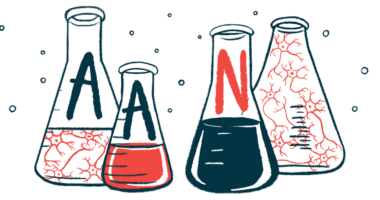Verge Starts First-in-human Trial of Its Novel PIKfyve Inhibitor for ALS
AI-discovered therapy moves from research to clinic in just 4 years

Four years after its discovery via an artificial intelligence (AI) platform, Verge Genomics will test its amyotrophic lateral sclerosis (ALS) treatment candidate VRG50635 — a PIKfyve inhibitor — in a first-in-human trial.
The Phase 1 clinical trial (ISRCTN14792372), which is now enrolling participants, is being conducted at the Centre for Human Drug Research in the Netherlands.
PIKfyve was identified as a potential target for ALS in a landmark 2018 study.
“Advancing VRG50635 from research to clinic in just four years offers clear proof of our team’s commitment to disciplined execution and is a leading indicator of the potential efficiency gains from tech-enabled drug discovery,” Alice Zhang, CEO of Verge, said in a company press release.
Testing the PIKfyve inhibitor in humans
The trial will be conducted in two portions and will be double-blind, meaning that neither researchers nor participants will know who receives the therapy and who a placebo.
In the Phase 1a part, researchers will test one or multiple doses of VRG50635 or a placebo in healthy volunteers, ages 18 to 65. This part of the trial will test doses ranging from 60 to 1,800 mg and aims to assess the treatment’s safety and tolerability profile in humans.
It also will investigate the therapy’s pharmacological properties, including the effects of taking VRG50635 with or without food.
In the Phase 1b portion, people with ALS, ages 18 to 80 and within five years of their diagnosis, will be randomly assigned to receive VRG50635 or a placebo for about one month. The patients will then, after a two-week interval, switch to the opposite treatment group for another month.
This portion of the study also mainly aims to explore safety and pharmacological outcomes, though exploratory analyses of potential efficacy will be conducted.
“We look forward to sharing the progress of our VRG50635 clinical studies and continued research in due course,” said Robert Scannevin, PhD, Verge’s chief scientific officer.
VRG50635 is a small molecule inhibitor designed to inhibit the PIKfyve molecule and increase the number of lysosomes in cells. Lysosomes are cellular organelles that break down faulty or unwanted molecules, and are essential to prevent the accumulation of toxic proteins.
In patients with ALS, however, these cellular components are usually faulty, leading to the buildup of toxic protein clumps.
PIKfyve was discovered as a potential target in ALS through CONVERGE, a platform developed by Verge that uses artificial intelligence (AI) to sort through human biological data from people with ALS.
This platform showed that lysosomes are dysfunctional in ALS, and that PIKfyve was a promising target for restoring their function. Those discoveries led to the development of VRG50635.
“For years, researchers have heavily relied on animal or cell models to identify new targets, in a way that oversimplifies the enormous complexity of human biology, particularly for diseases like ALS,” Scannevin said.
“The CONVERGE platform starts with, and integrates human data and human model systems throughout discovery and development. This provides unique insights into the biological underpinnings of ALS, and also predicts drug targets … that can broadly impact these complex, disease-relevant processes,” he added.
According to Zhang, the Phase 1 trial “is just the start” of an overarching plan by Verge to target ALS.
The company is working “to develop a robust clinical pipeline of new medicines demonstrating that a human-to-human rather than an animal-to-human approach has the potential to transform clinical success rates,” Zhang said.
“We are proud to be not just one of the few AI-driven biotech companies to have made it to the clinical stage, but also one of the first to bring forward a novel clinical compound against a novel target, that was entirely discovered and developed internally on our platform,” she added.







